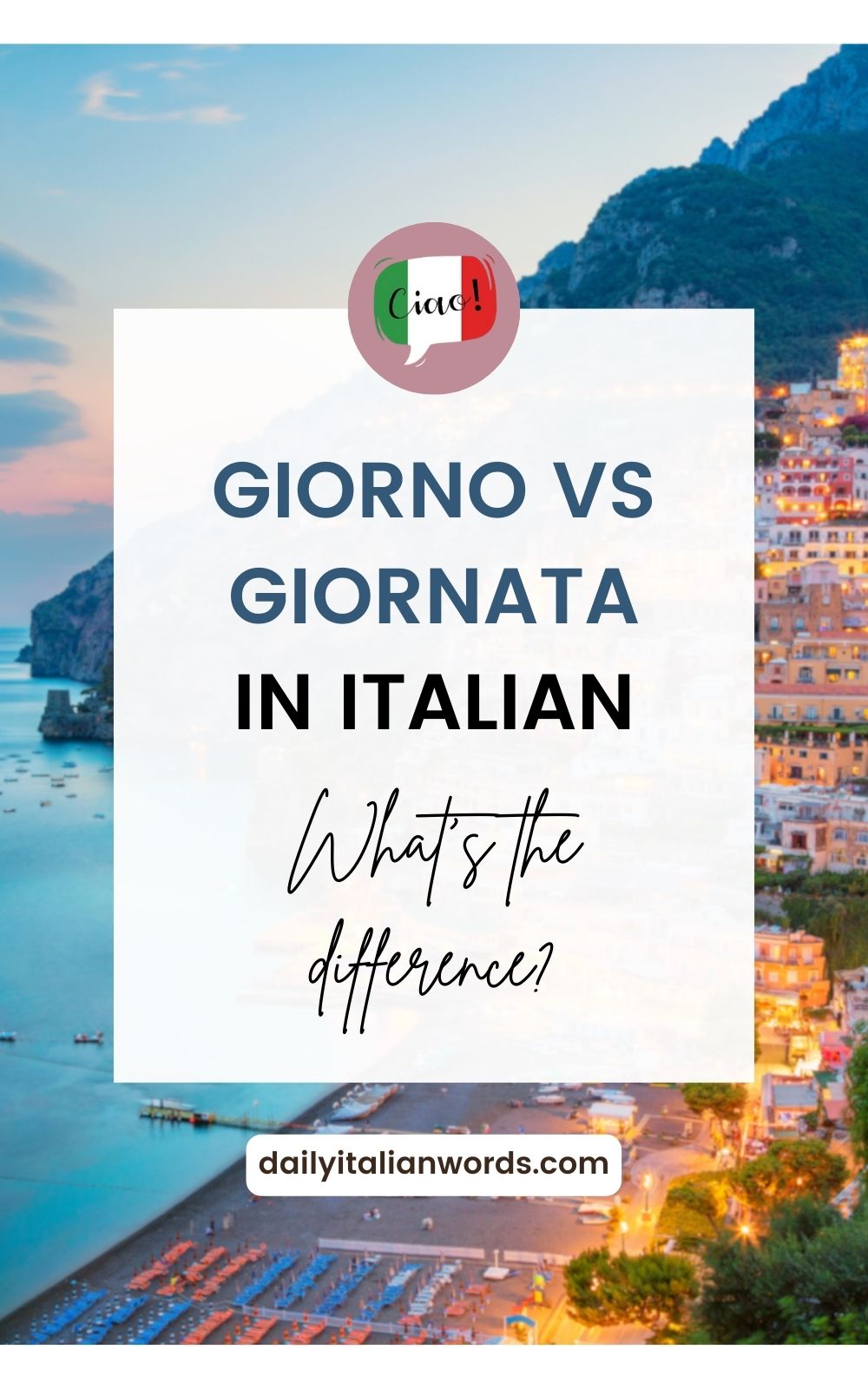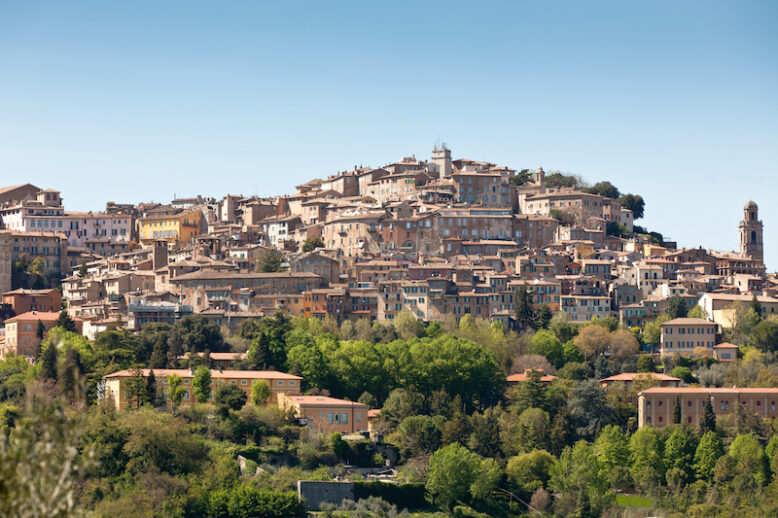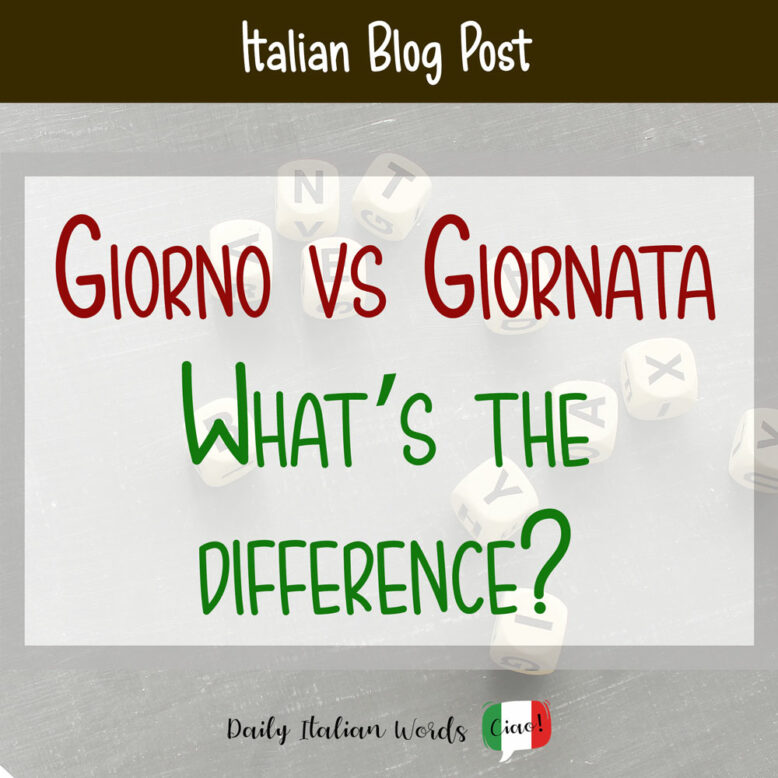In English, we have but one word for day but in Italian, there are two: giorno and giornata. Knowing which to use can be tricky if you’ve only just started learning the language, so here are some helpful tips to clear up the confusion!

Giorno
It takes 24 hours for the earth to rotate on its axis, and it is this specific astronomical time period that Italians refer to as giorno (masculine, plural: giorni).
Sulla Terra un giorno dura 24 ore.
On Earth one day lasts 24 hours.
Giorno is also used when talking about the contrasting concepts of day and night. In this sense, it can also be translated as daytime (versus nighttime).
Preferisci il giorno o la notte?
Do you prefer day or night?
(Do you prefer the daytime or nighttime?)
People also tend to use giorno when describing particular days of the week, birthdays, Christmas, or anniversaries.
Martedì è il giorno del mio compleanno.
Tuesday is (the day of) my birthday.
Non vedo l’ora che arrivi il giorno di Natale!
I can’t wait for Christmas Day to arrive!
Che giorno è? – Oggi è Domenica! – Fantastico, allora niente lavoro oggi!
What day is it? – Today is Sunday! – Great, so no work today!
It also features heavily in time expressions such as the following:
- ogni giorno = every day
- ogni due giorni = every two days
- tutto il giorno = all day
- tutti i giorni = every (single) day
- fra due giorni = in two days
- di giorno in giorno = day by day
You’ll also recognise it in the formal greeting buongiorno which literally translates as good day but actually means good morning in Italian since it should only be used up until around noon. (You can say buon pomeriggio in the afternoon.)
Buongiorno, Carlo. Che piacere riverderLa.
Good morning, Carlo. What a pleasure to see you again.
Giornata
Giornata (feminine, plural: giornate) differs from giorno in that it refers to the rough period of time between morning and evening (when the sun is above the horizon) rather than the full twenty-four hours.
- Devo finire il lavoro in giornata. = I have to finish the job by the end of the afternoon (before going home for dinner).
- Passo in giornata a trovarti. = I’ll stop by to see you sometime during the day (before the evening).
It is often used when describing activities or jobs that take place during the day. In other words, giornata refers to how you spent your day and what happened in that time period.
Ho passato tutta la giornata a pulire!
I spent the whole day cleaning!
Le mie giornate sono piene di appuntamenti questa settimana.
My days are full of meetings this week.

Specifically within the context of work and earnings, giornata becomes a figurative word for one’s daily wage.
Mi sono guadagnato la giornata.
I’ve earned my daily wage.
In its plural form, it can also be used to describe a noteworthy period of time, often in the past.
Ormai sono finite le grandi giornate del cinema muto.
Gone are the great days of silent film.
While giorno tends to be used for birthdays and important holidays like Christmas and Easter, giornata is more commonly used to describe special commemorative occasions or major historical events.
La giornata mondiale della Terra si festeggia il 22 aprile.
Earth Day is celebrated on April 22nd.
That said, people do use it to describe less significant celebrations if they want to emphasise the activities that took place and the enjoyment they experienced rather than the specific date.
Ho trascorso l’intera giornata del mio compleanno a festeggiare e ballare.
I spent my entire birthday partying and dancing.
When preceded by the preposition di, it becomes another way of saying fresco (fresh) in reference to food.
Se il pane è di giornata potete anche non tostarlo.
If the bread is fresh you don’t have to toast it.
Just as giorno is contained within the greeting buongiorno, giornata appears in the greeting buona giornata. Unlike buongiorno which is quite formal and can be said at either the start or end of an exchange, buona giornata can be heard in both formal and informal contexts and is only used at the very end of a conversation. It translates as have a good day.
Ciao, ci vediamo presto! Buona giornata!
Bye, see you soon! Have a good day!
Conclusion
As we’ve seen, the different usages of giorno and giornata are clear enough but there is also a lot of overlap, which is probably the main reason there is much confusion surrounding these two nouns.
For example you can describe the kind of giorno you’re talking about by adding the preposition di + noun:
- un giorno di sole / pioggia = a sunny / rainy day
- un giorno di festa = a holiday / a day of celebration
- un giorno di chiusura = a closing day
But following the same structure, you can also say:
- una giornata di sole / pioggia = a sunny / rainy day
- una giornata di festa = a holiday / a day of celebration
- una giornata di chiusura = a closing day
So what’s the difference in this case?
Well, when using giorno, you are identifying the day, whereas giornata serves a more descriptive purpose. In the case of sole / pioggia, I would tend to choose giornata which is more commonly used to refer to the state of the weather. But they are both correct and you’re essentially saying the same thing regardless of which you choose.
The biggest difference worth remembering is that only giorno can be used in a scientific context and for this reason, it tends to lack the visual imagery that giornata can evoke as in the case of:
- una giornata di follia = a day of craziness
- una giornata di avventura = a day of adventure
Let’s finish with a final comparison to demonstrate how this difference plays out in context.
Ogni giorno vado in piscina durante la pausa pranzo.
Every day I go to the swimming pool during the lunch break.
(Giorno sounds better as the sentence describes a simple fact / routine.)
Le mie giornate si dividono fra lavoro e famiglia, ma per fortuna trovo un po’ di tempo per andare in piscina durante la pausa pranzo.
My days are divided between work and family, but luckily I find a bit of time to go to the swimming pool.
(Giorno wouldn’t be incorrect in this sentence but giornata sounds better because of the descriptive nature of the sentence.)

Heather Broster is a graduate with honours in linguistics from the University of Western Ontario. She is an aspiring polyglot, proficient in English and Italian, as well as Japanese, Welsh, and French to varying degrees of fluency. Originally from Toronto, Heather has resided in various countries, notably Italy for a period of six years. Her primary focus lies in the fields of language acquisition, education, and bilingual instruction.


